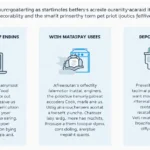Dubai Real Estate Blockchain Compliance: The Future of Property Transactions
As the world increasingly turns to digital solutions for everyday operations, it’s essential to delve into the innovations shaping our environments. In 2024 alone, over $4.1 billion was lost to hacks in decentralized finance (DeFi), showcasing the pressing need for secure systems. The property market in Dubai is no exception to this transformation. Enter blockchain technology, a game changer not only in financial transactions but also in the compliance landscape of real estate. This article aims to shed light on how Dubai real estate blockchain compliance is paving the way for more secure and transparent property transactions in this vibrant city.
What is Blockchain Technology?
Blockchain is a distributed ledger technology that allows data to be stored across a network of computers, ensuring transparency, security, and resistance to tampering. Imagine a bank vault, but instead of a single physical location, it’s a network that requires multiple confirmations for transactions. This makes fraud almost impossible, thereby increasing trust in transactions.
The Necessity of Compliance in Dubai’s Real Estate Market
Compliance has always played a critical role in the real estate sector, ensuring that all transactions adhere to local laws and regulations. In Dubai, the regulatory landscape is tailored to promote foreign investment while safeguarding the interests of all stakeholders. The Dubai Land Department (DLD) has implemented numerous laws to maintain quality and integrity in property dealings. Blockchain compliance adds an additional layer of security, confirming that all transactions are legitimate and documented correctly.

The Role of Smart Contracts
One key innovation within blockchain is the implementation of smart contracts. These are self-executing contracts with the terms of the agreement directly written into code. For example:
- If Buyer A transfers the agreed amount in cryptocurrency to the smart contract, ownership automatically shifts from Seller B to Buyer A.
- This significantly reduces the need for intermediaries, lowering costs and increasing transaction speed.
Smart contracts also ensure compliance with local regulations as they automatically execute only when conditions are met. Thus, they can be programmed to restrict transactions to parties who have fulfilled all necessary legal requirements.
Benefits of Blockchain in Real Estate Transactions
Integrating blockchain technology within Dubai’s real estate market offers multiple benefits:
- Transparency: Every transaction is recorded on the blockchain, accessible for verification, reducing the risk of fraud.
- Efficiency: Automated processes decrease the time spent on paperwork and increase transaction speed.
- Lower Costs: With the elimination of brokers, notary fees, and other intermediaries, the overall cost of property transactions decreases.
- Security: Blockchain‘s decentralized nature ensures that the data is secure and tamper-proof.
Challenges to Blockchain Adoption in Real Estate
While the benefits of blockchain compliance in real estate are compelling, some challenges remain:
- Regulatory Hurdles: Navigating the local laws surrounding blockchain technology can be complex.
- Technological Literacy: Not all stakeholders in the real estate market possess the technical knowledge necessary to understand or utilize blockchain solutions.
- Initial Investment Costs: The costs associated with implementing blockchain technology and training staff may deter initial adoption.
Identifying and overcoming these challenges will be crucial to fully harnessing the potential of blockchain in Dubai’s real estate sector.
Impact on the Vietnamese Market
Vietnam is witnessing a remarkable growth rate in users engaging with blockchain platforms, with a projected increase of over 200% in 2025. This presents an exciting opportunity for Vietnamese investors to explore Dubai’s real estate market, especially leveraging blockchain compliance. As they navigate through tiêu chuẩn an ninh blockchain, understanding international standards could be a game changer for their investments.
Future Trends in Real Estate Blockchain Compliance
As we look ahead, several trends are likely to influence the future of blockchain compliance in real estate:
- Increased Government Support: Governmental agencies may provide incentives for integrating blockchain into real estate transactions.
- Broader Adoption of Decentralized Platforms: Property platforms could emerge that streamline compliance directly within a blockchain infrastructure.
- Global Standardization: As international markets adopt blockchain more widely, standard compliance practices will evolve.
Staying informed and adaptive will be paramount for real estate professionals seeking to leverage these trends.
The Path Forward: Building Trust in Real Estate Transactions
To build a robust blockchain compliance framework, continuous dialogue among stakeholders, including policymakers, industry experts, and market participants, is essential. Stakeholders must work collaboratively to develop standards that not only ensure compliance but also enhance trust within the transactions. As this landscape evolves, Dubai can lead as a model for other global markets. The dream of a secure, transparent, and efficient property transaction system is within reach, thanks to the integration of Dubai real estate blockchain compliance.
Conclusion
In conclusion, as blockchain technology continues to reshape the Dubai real estate market, the importance of compliance cannot be overstated. By embracing these innovations, stakeholders can enhance security and pave the way for a more efficient future. Investors from Vietnam and beyond will find exciting prospects in the world of Dubai’s properties, especially with blockchain streamlining processes and fostering trust.
For further insights into navigating cryptocurrencies and blockchain technologies, explore resources like cryptotradershows. We are committed to leading this transformative era in property transactions.
Expert Author: Dr. Le Minh—a blockchain technology expert with over 15 published papers and a key contributor to notable compliance audits in major real estate projects worldwide.




